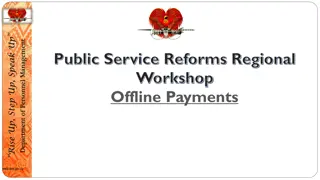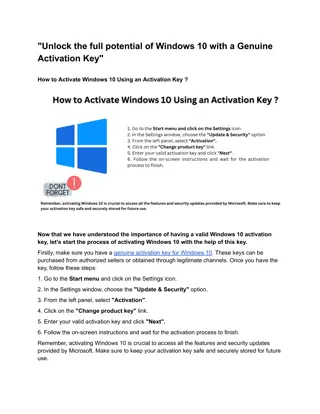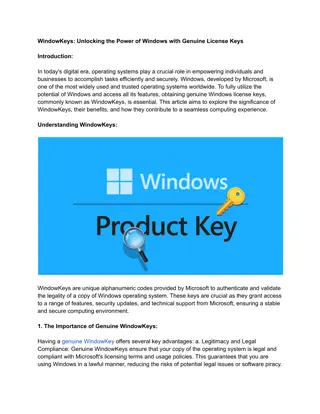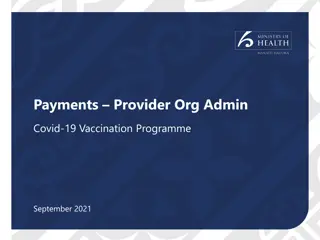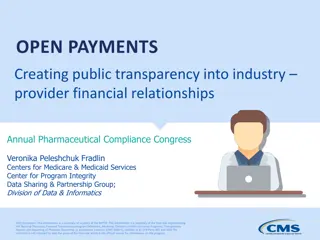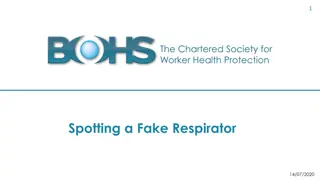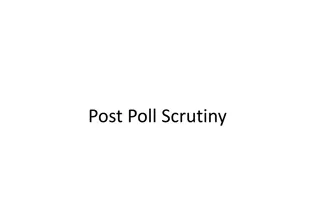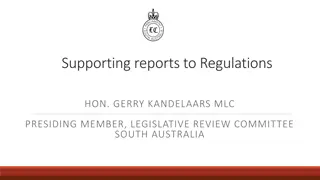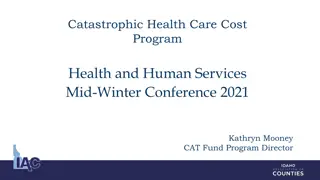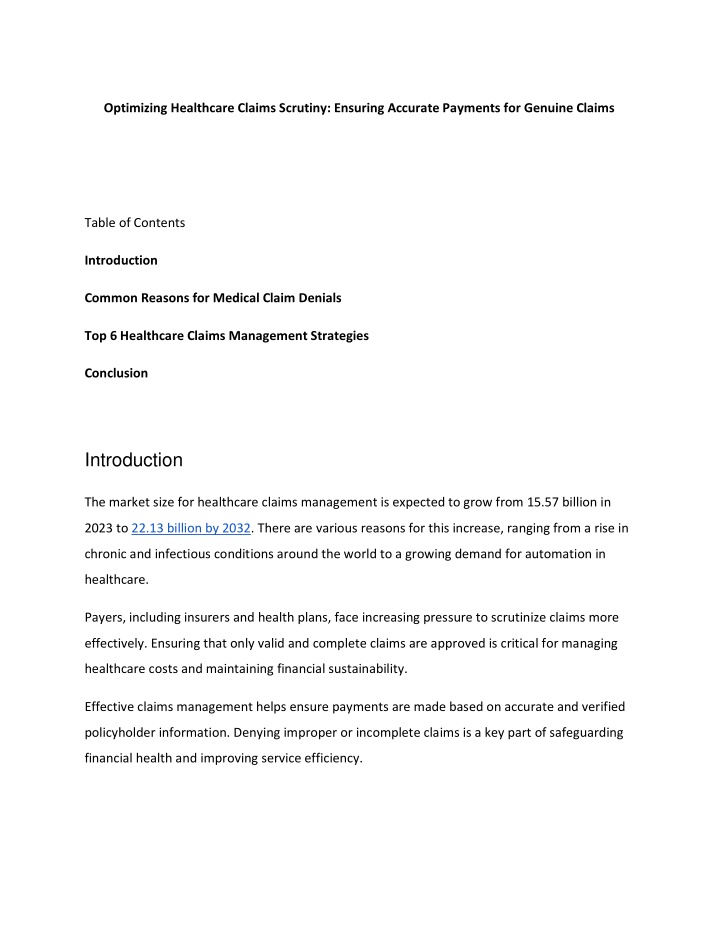
Optimizing Healthcare Claims Scrutiny_ Ensuring Accurate Payments for Genuine Claims
Discover strategies to enhance healthcare claims scrutiny, minimize errors, and ensure accurate payments for genuine claims. Optimize your claims process with proven techniques.
Uploaded on | 2 Views
Download Presentation

Please find below an Image/Link to download the presentation.
The content on the website is provided AS IS for your information and personal use only. It may not be sold, licensed, or shared on other websites without obtaining consent from the author. If you encounter any issues during the download, it is possible that the publisher has removed the file from their server.
You are allowed to download the files provided on this website for personal or commercial use, subject to the condition that they are used lawfully. All files are the property of their respective owners.
The content on the website is provided AS IS for your information and personal use only. It may not be sold, licensed, or shared on other websites without obtaining consent from the author.
E N D
Presentation Transcript
Optimizing Healthcare Claims Scrutiny: Ensuring Accurate Payments for Genuine Claims Table of Contents Introduction Common Reasons for Medical Claim Denials Top 6 Healthcare Claims Management Strategies Conclusion Introduction The market size for healthcare claims management is expected to grow from 15.57 billion in 2023 to 22.13 billion by 2032. There are various reasons for this increase, ranging from a rise in chronic and infectious conditions around the world to a growing demand for automation in healthcare. Payers, including insurers and health plans, face increasing pressure to scrutinize claims more effectively. Ensuring that only valid and complete claims are approved is critical for managing healthcare costs and maintaining financial sustainability. Effective claims management helps ensure payments are made based on accurate and verified policyholder information. Denying improper or incomplete claims is a key part of safeguarding financial health and improving service efficiency.
In this article, we outline the primary reasons for claims denial from a payer's perspective and how claims management services can help payers streamline their claims management process to ensure that only genuine claims are processed. Common Reasons for Medical Claim Denials For payers, denying claims is often necessary to prevent improper payouts, especially in cases of non-compliance or missing information. The most common reasons for claims denial include: Lack of Pre-Authorization: Some insurance plans need pre-authorization or referral for certain services or procedures. If pre-authorization or referral is not obtained when needed, claims might be denied. Inaccurate Patient Information:A common reason for claim denial is inaccurate patient information. Examples are incorrect patient date of birth, insurance information, or name. Timelines: It is crucial to submit claims promptly. If claims are submitted post the deadline, they could be denied. Coding Errors: Coding errors could include, for example, outdated or incorrect codes, insufficient documentation to support codes used, or codes that do not match the diagnosis of the patient. Exceeded Benefit Limits: Certain insurance plans may have benefit limits for some services or procedures. Claims could be denied if these limits are exceeded. Missing Insurance Information: Examples of missing or incorrect insurance information could include wrong policy numbers, insurance ID numbers, or group numbers. Non-Covered Services: Certain services might not be covered by insurance plans.
Challenges in Claims Scrutiny Payers are confronted with various challenges when scrutinizing healthcare claims, ranging from administrative burdens to the complexity of managing data across multiple systems. Some of the key challenges include: Data Overload: Healthcare claims often involve large amounts of data, including patient information, treatment codes, and insurance details. Ensuring that all this data is accurate and complete is difficult, especially when claims are processed across multiple systems with varying standards for data entry and validation. Changing Regulations: Healthcare is a highly regulated industry, with frequent changes in coding standards (such as ICD-10, CPT, and HCPCS codes), compliance requirements, and payer-specific guidelines. Increased Risk of Fraud: Healthcare fraud is a growing concern for payers, as fraudulent claims can result in substantial financial losses. Fraudulent claims may involve billing for services that were never provided, submitting duplicate claims, or inflating treatment costs. How Payers Can Scrutinize Claims More Effectively Optimizing claims review processes requires a multifaceted approach. Here are 6 strategies to help achieve this. 1. Data Accuracy and Integration Ensure accurate data entry at every stage of the claims lifecycle. By consolidating data across various systems and automating error detection, payers can reduce the risk of incorrect or duplicate claims being submitted. 2. Accurate Documentation and Auditing Robust auditing helps ensure that supporting documents align with the claims submitted. These audits help payers identify gaps in provider documentation, ensuring claims meet the necessary standards before approval.
3. Pre-Authorization Obtainment Payers should implement streamlined pre-authorization procedures, ensuring that every claim requiring prior approval is verified. This prevents unauthorized claims from being processed, minimizing payout risks. 4. Comprehensive Training Programs Implement training programs that ensure payer teams stay updated on the latest coding standards, payer-specific rules, and compliance guidelines. This reduces the likelihood of errors in claims processing and ensures that claims are adjudicated according to policy requirements. 5. Denial Management System An effective denial management system helps payers track and categorize denied claims. It allows payers to identify patterns in claim denials, such as recurring coding errors or documentation gaps, and take corrective action to prevent similar denials in the future. Such a system also ensures that denied claims are reviewed thoroughly and resubmitted if appropriate. 6. Enhanced Follow-Ups Timely follow-up on claims minimizes delays in payment and reduces the risk of unpaid claims. Payers should implement systematic follow-up processes, prioritizing high-value claims and using data analytics to identify trends that may indicate issues in the submission process. Clear communication with healthcare providers is also essential to resolve issues quickly and ensure that claims are processed efficiently.
Conclusion By ensuring that only genuine claims are processed and paid, payers can control healthcare costs, protect their financial resources, and comply with regulations. As healthcare costs continue to rise and the complexity of claims increases, payers must invest in strategies that improve the scrutiny and management of claims, ensuring that payments are made accurately and only for legitimate services. By adopting these strategies, payers can build a more robust and financially sustainable claims management process. Silverskills can help you transform the claims management process by mitigating risks and ensuring accuracy in critical forms. Contact us now to avail our claims management services. Healthcare Claims Management: Ensuring Accurate Meta title Payments Discover the reasons for claims denial from a payer's perspective and how payers can streamline their claims management process. Meta description Primary keyword Healthcare Claims Management healthcare claims management system, medical claim LSI keywords management Service-specific keywords claims management services
URL optimizing-healthcare-claims-management Effective claims management helps ensure payments are made based on accurate and verified policyholder information. Audits help payers identify gaps in provider documentation, ensuring claims meet the Blog highlights necessary standards before approval.



